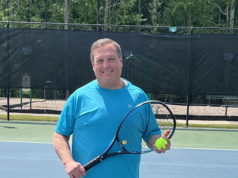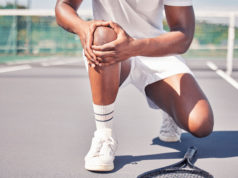By Mark Kovacs, Ph.D., CTPS, MTPS, Kovacs Institute
The work we do with some of the best athletes in the world involves advanced sport science concepts. Did you know that adult recreational players can benefit greatly from incorporating sport science into training? Sport science is the study of how the body responds to physical activity and how to optimize performance through training and recovery. At our institute, we study how these methods used by the top players in the world could benefit the adult recreational player. Here are some of the top tips we’ve determined could help to improve your game.
First and foremost, it is important to understand the importance of proper warm-up and cool-down. A proper warm-up is essential for preparing the body for physical activity and reducing the risk of injury. This should include a combination of dynamic stretching and light, tennis-specific movement exercises to increase blood flow and raise the heart rate, while also getting the body and mind ready for tennis competition. Similarly, a proper cool-down is important for promoting recovery. This should include static stretching and light cardio exercises to bring the heart rate back to normal.
Another key aspect of sport science is to understand the importance of hydration. The human body is made up of more than 60-percent water, and staying hydrated is essential for maintaining energy levels, regulating body temperature, and limiting the likelihood of cramping. It’s recommended to drink at least two (68 oz) to three (100 oz) liters of water per day, and significantly more during intense physical activity in hot and humid conditions (like an Atlanta summer). Also, it’s important to consume electrolytes to replenish those lost through sweating.
In addition to proper warm-up, cool-down and hydration, adult recreational players also should focus on developing good technique and proper form. This includes learning the proper grip, stance, and swing for different shots. By using the right technique, players can reduce the risk of injury and improve their performance. Sport scientists have studied the biomechanics of tennis strokes, which can help players to understand how to generate more power and accuracy with their shots. Work with your tennis professional who is also certified through the International Tennis Performance Association (iTPA) as a Tennis Performance Trainer (TPT) or Certified Tennis Performance Specialist (CTPS) to ensure they have a strong background in tennis fitness and sport science.
Another important aspect of sport science for adult recreational players is to focus on tennis-specific fitness. Tennis is a demanding sport that requires a combination of endurance, strength, and agility. A well-rounded fitness program that includes tennis-specific endurance, strength training, and flexibility exercises can help to improve overall fitness and reduce the risk of injury. Sport scientists have studied the energy systems involved in tennis, which can help players to understand how to improve their endurance and stamina in the most efficient manner possible.
Finally, adult recreational players also should focus on the mental aspects of the game, such as confidence, focus, and motivation. Tennis is a sport that requires a lot of mental focus and concentration, and adult recreational players can benefit greatly from incorporating mental training techniques into their preparation. This includes visualization, goal setting, and self-talk, which can help players to improve their performance and improve the areas that may be holding them back in matches.
In conclusion, sport science concepts can provide adult recreational players with valuable insights and tips to improve their game. By incorporating proper warm-up and cool-down, hydration, proper technique, overall fitness, and mental training into their training program, players can achieve their goals and take their game to the next level. Remember to always consult with a professional when developing your training program, to ensure that you are safe and progressing in the right direction.
A great way to find a new coach is to tap into the Georgia Professional Tennis Association (GPTA) to find the most experienced and best coaches in Atlanta! The GPTA have criteria which makes their pros “a cut above” the rest. GPTA members must be certified PTR or USPTA. GPTA offers many events during the year where members can network, pick up new drills, get valuable information from nationally renowned speakers, and obtain continuing education credits from their respective certified organization.
The GPTA is in the process of developing and publishing a database of contact information on its coaches based on geographic location for those who are looking for a certified tennis professional/coach. In the coming months, if you want to look for a coach who is in the GPTA, you can go to gpta.com, and click on the “Find a Coach” option.




